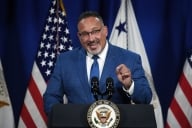You have /5 articles left.
Sign up for a free account or log in.
UPDATE: The University of Wisconsin Board of Regents voted today to approve the policies referenced below. Inside Higher Ed will have a full report tomorrow. Protests by audience members interrupted the meeting.
The University of Wisconsin System Board of Regents votes today on new tenure, posttenure review and faculty layoff policies to close gaps in tenure protections created by a new state law. But some members of the systemwide task force that drafted the policies being considered say they had little input, reported The Cap Times. Bradley Seebach, an associate professor of biology at the University of Wisconsin at LaCrosse, told the paper despite assumptions that the draft policies represent the consensus of the 20-person task force, “no [one] can say whether the draft policies represent the common viewpoint of the task force members. This is because the members of the task force were never asked to endorse the policy statements, either as a whole or in individual parts. Like many other task force members, I went into the process assuming that we would be asked to endorse final policy statements.”
Another task force member who did not identify him or herself in responding to an informal poll by the Times said, “Since our input was ultimately ignored, I begrudge every minute wasted” on the task force. The same respondent said the new posttenure review policy “gives too much power to administrators and not enough time to turn around a subpar research program. These points were made very clear by the committee, and they were ignored.” One respondent, meanwhile, supported all three policies, saying they will keep the system competitive with other institutions.
The American Association of University Professors remains opposed to some aspects of the proposed policies. David Vanness, an associate professor of population health sciences at the University of Wisconsin at Madison and head of its AAUP chapter, said in statement on Facebook Wednesday that the proposed policy on layoffs of tenured faculty members allows the administration “to discontinue programs (and lay off faculty) because other programs may be considered higher priority” because it wrongly conflates educational considerations and financial concerns.
The draft policy says, in part, that "educational considerations are related in part to regular program review, and reflect a long-range judgment that the educational mission of the institution as a whole will be enhanced by program discontinuance. This includes the reallocation of resources to other programs with higher priority based on educational considerations. Such long-range judgments generally will involve the analysis of financial resources and the needs of the program and any related college or school."
Vanness wrote that while the first sentence is fine, the last two “are disasters waiting to happen. If the administration decides, for example, that climate science is a lower priority than petroleum engineering, well -- it could be good-bye, climate science! It need not be so obviously political -- but do we want to work in a climate where we are competing against each other for our own jobs? We're talking Academic Hunger Games here, folks.”
Another “land mine” lurks in the inclusion of "current and predicted comparative cost analysis/effectiveness of the program" in the list of "educational considerations," Vanness said. If program A graduates more majors per dollar spent than program B, then program B could be discontinued, Vanness argues. “What metric will be used to choose? The policy doesn't specify -- and doesn't give faculty the responsibility to decide (assuming that using comparative cost-effectiveness is even an appropriate reason to lay off faculty). … The only acceptable conditions for faculty layoff are either a true institutionwide financial emergency or that a program should be discontinued for bona fide educational considerations, as determined by the faculty (who, after all are supposed to have primary responsibility for curriculum and research)."
The university system has maintained that its proposed standards are on par with peer institutions.
Meanwhile, Madison last semester gave out $726,436 in raises and $8 million in research support to maintain 40 top faculty members being courted by other institutions, the Journal-Sentinel reported, based on information it obtained via an open records request. The number of professors taking outside offers to the central administration has reportedly increased this year, as many expected, since the Wisconsin Legislature changed the state’s tenure law and cut $250 million from the university system’s budget last summer. Madison Chancellor Rebecca Blank said at a recent Board of Regents meeting, according to the Journal-Sentinel, that in retaining the 40 professors, the university kept $18 million in federal research grants on campus. A half dozen faculty members who received retention offers decided to leave Madison anyway, and several professors who decided to stay reportedly remain worried about a long-term decline in faculty morale and working conditions.









